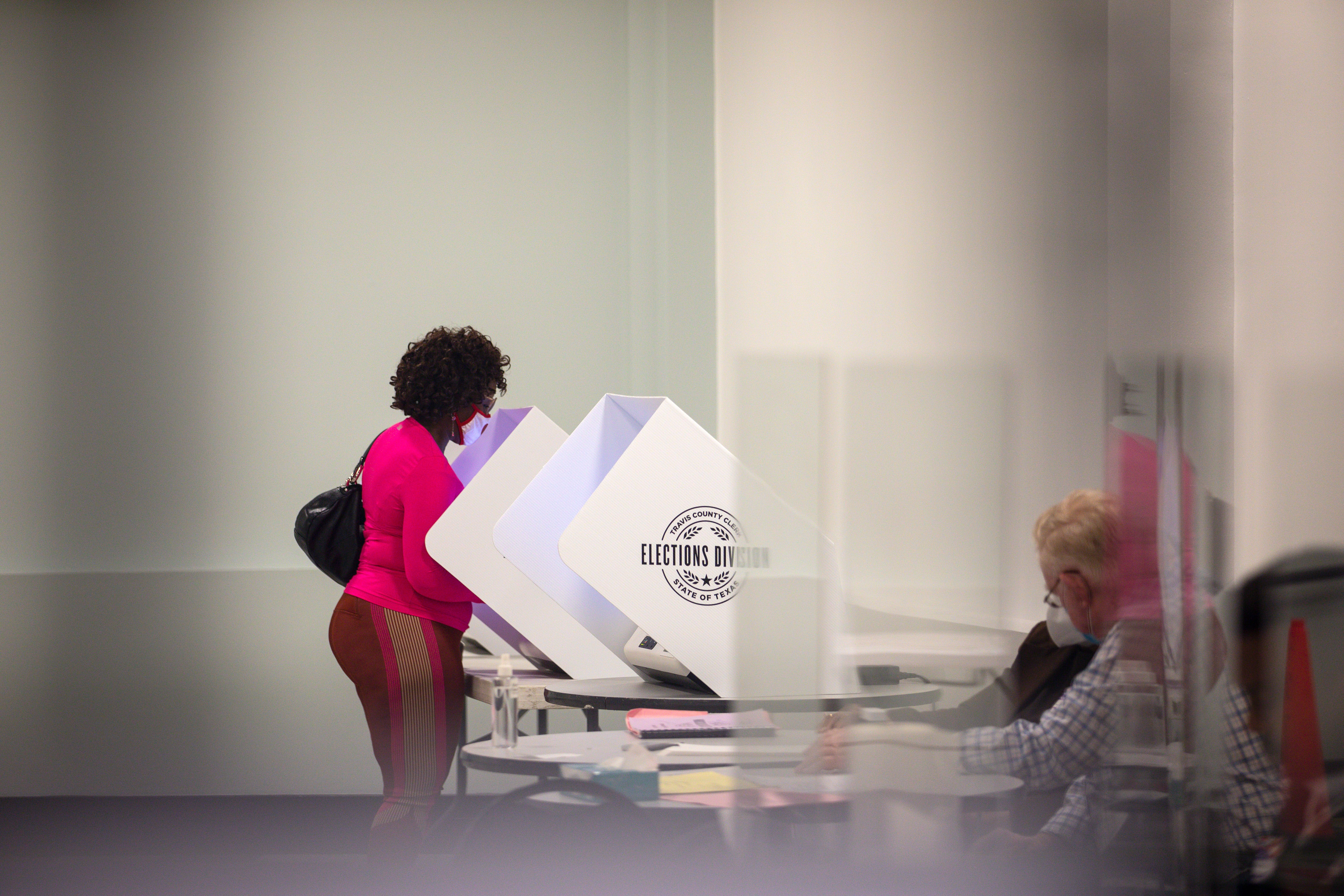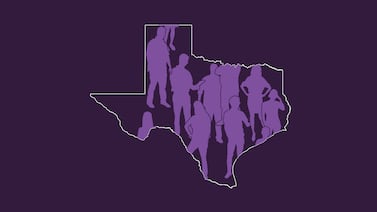A version of this post was originally distributed in Votebeat’s weekly newsletter. Sign up here.
We have survived another round of elections, everyone. Congratulations.
But a bigger congratulations goes to election administrators in Texas and Georgia, who pulled off successful elections last week after both states passed winding and largely unnecessary laws last year, aimed at combating nearly non-existent fraud. If you listen to the folks who support those laws, they’re saying all the smooth processes and heavy participation (in Georgia, at least, where turnout was high) are proof those laws couldn’t possibly have made voting harder.
We give this claim three bamboo fibers out of five, which just might be our new unit of measurement for something that’s gone awry.
It’s a logically flawed argument that people have been making, in various forms, for decades. In some sense, it is the same underlying concept behind former President Donald Trump’s repeated assumption that high turnout is good for Democrats, and low turnout is good for Republicans — as if turnout can be boiled down to a few, basically intractable things decided years or months in advance, like party affiliation and laws on the books about voting. That’s not the way this works, and it’s an argument political scientists have repeatedly debunked.
This, for example, is from the back cover of the book, “The Turnout Myth: Voting Rates and Partisan Outcomes in American National Elections,” by political science professors Daron Shaw and John Petrocik: “Less engaged citizens’ responses to short term forces—candidate appeal, issues, scandals, and the like—determine election turnout. Moreover, Republican and Democratic candidates are equally affected by short-term forces. The consistency of these effects suggest that partisan conflict over eligibility, registration and voting rules and regulations is less important for election outcomes than both sides seem to believe.”
To assume that higher turnout must mean the laws did not detract from the ease of voting is to discount a countless number of things. Among them: Election administrators work incredibly hard to educate citizens about the impacts of laws and how to comply with them; advocates and non-profit organizations have spent a significant amount of money and time in places like Texas and Georgia and have helped these states hit record-breaking voter registration; and—maybe most crucially—how pissed off people are about these very laws.
Swelling anger at the passage of a law is not the same thing as the law having no ill effects, and those who ask you to equate the two are not being intellectually honest. Even if the population at large has not been moved to vote because of their own anger at these laws, they may well have been approached to register to vote by an organization reacting to them. Either way, it takes time and resources that could be spent elsewhere.
Let’s drill in, for a moment, on Texas, where turnout was as expected but mail-ballot rejections were down markedly from only a couple of months ago. We know that during the primary this year, tens of thousands of ballots were rejected across the state because of the new voting law, which required voters to put either their drivers license number or a partial Social Security number on the outside envelope of the ballot. Counties were forced to comply with this law in a matter of months, as Texas has among the earliest primaries in the country. But this week, during the runoff election, rejection rates decreased to near-normal levels. Why?
Not because the law wasn’t detrimental. That was clearly established by the primary. The improvement was at least partially because election administrators actually had time to take (and went through the trouble of taking) several steps, expensive in terms of both money and time, to improve the process.
Lorraine McKay, the ballot-by-mail coordinator in Williamson County, Texas (just north of Austin), said this time around, county administrators took a range of steps they were unable to take leading up to the primary. They sent out mailers with each ballot, encouraging people to list both numbers (even though federal law only permits states to require one of them) to avoid rejections. They also modified the design of the envelopes to call attention to the requirement, and have expedited the process of sending out rejections so that affected voters have as much time as possible to fix the error through the ballot curing process.
“Our office as a whole has made a point to remind by mail voters of the new requirements, even when they call with a different question. Every interaction is an opportunity to help a voter successfully cast their vote,” she said.
Prior to the primary, administrators were worried about what they could legally tell voters. The law made soliciting the use of absentee ballots for those who didn’t request them a state jail felony (a real Texas thing), leaving officials wondering how able they were to instruct potential applicants. That has sorted itself out. Administrators have received guidance from the Texas secretary of state’s office, allowing them to be far more proactive in their approach to voter education.
Potter County administrator Melynn Huntley, for example, wrote an op-ed for the local Amarillo Globe News explaining the requirements. “It’s important for all voters who are eligible to vote by mail to be aware of three substantial changes to the ballot by mail process in Texas,” she wrote. “Understanding these three modifications of the election law will help you make sure your vote counts.”
Huntley told Votebeat the outreach worked. “Many of our ballot by mail voters are not on social media, so I went old school,” she said, emphasizing the need to convey the same information via different methods for different groups of voters. In Texas, most people who cast mailed ballots are over the age of 65. “We had voters calling to tell us that they finally understood what they should do.”
“County election officials across the state have rightly recognized they indeed can discuss the new mail ballot requirements, and as a result have been much more active about educating their mail voters about the new ID requirement, including utilizing information we’ve made available through VoteTexas.gov,” said Sam Taylor, spokesperson for the secretary of state’s office. “We’ve also provided them with a road map for voter education on the new ID requirement through informational pamphlets available in English and Spanish”.
Of course, Texas’s elections administrators have done all of this work basically because Texas legislators feel exaggerating the possibility of voter fraud will improve their own political standing. Almost no part of either Texas’s or Georgia’s new laws meaningfully increases election security, as we and others have reported.
It is, simply, illogical to assume that these laws are pro-voter — or at least voter-neutral — baed on turnout. Turnout, as Shaw and Petrocik articulate, is more attributable to “short term forces.” Those forces are anger over policies, excitement or concern over a candidate on the ballot, or a hundred other things that temporarily motivate voters.
Imagine, for a moment, we were discussing a radio contest. The rules to enter were straightforward and easy, and the prize was $250. Not very exciting. The next year, they require you to send in three photos of yourself completing a variety of dangerous physical feats, but they offer a car and a million dollars as a reward. Would anyone — anyone — claim heavy participation in that contest meant the rules were reasonable? No. They wouldn’t.
Let’s not do the same here. That voters can and often do overcome obstacles in order to vote doesn’t mean it’s healthy for democracy to erect them.
Back Then
Texas—and I can say this because I live here and I’m truly of this state—can be a pretty frustrating place to live, but some of us have a real way with words. Here is my favorite proposed (though, obviously, not passed) amendment in Texas history. It was written by a delegate to the legislature in 1875, whose Christian faith led him to conclude that women should, of course, have the right to vote.
“That women, being by the ordinances of nature, the mother of all living human beings…and that, as mother, wife, sister and daughter, she has the first care of our lives, is our nurse in childhood, our mentor in youth, our companion, helper and consoler in manhood, our comforting, ministering and sustaining angel in death, even at the birth, trial, death and resurrection of Jesus…and that, in this land of republican faith and representative, democratic government, by every recognition of modern, enlightened Christian civilization, she is morally and mentally man’s equal; that the same “inalienable rights” that Jefferson has made household words…are as much woman’s as man’s;...and inasmuch as woman is of the people, and must be governed by the laws made by the people, and is often a taxpayer, there is no reason, political, human or divine . . . why she should not have the same rights at the ballot-box that man has.”
Indeed.
In Other Voting News
- In a high-profile test of voters’ willingness to cast ballots for GOP officials who contradicted President Donald Trump’s false narrative of election fraud, Georgia Secretary of State Brad Raffensperger and Gov. Brian Kemp both won their primaries, defeating Trump-backed candidates. Nine of the state’s 2,500 precincts stayed open late to make up for earlier delays in opening, but Election Day went generally smoothly in the state, GPB reported, although a DeKalb county commission race will be recounted due to a programming error.
- In other Georgia news, rates of automatic voter registration rebounded after the state made a minor fix to its driver services website, resuming the registration of voters unless they opt out. The state fixed the problem after the Atlanta Journal-Constitution reported voter registration numbers had plummeted.
- The controversy over Facebook founder Mark Zuckerberg’s 2020 election grants continues to simmer. This long article in Protocol looks at how Zuckerberg’s efforts to stay nonpartisan placed him at the center of one of the most pernicious election conspiracy theories (and it cites Jessica Huseman’s reporting for Votebeat).
- The U.S. Department of Justice has filed only one federal lawsuit at the county level to challenge a redistricting plan and it concerns the elimination of a commissioners’ precinct in Galveston, Tex. The Texas Tribune took a deep look at how that precinct helped Black residents of Galveston build political power.
- The next chair of Wisconsin’s state elections commission must be a Republican. One of the two candidates, who has been criticized by fellow Republicans for pushing back on inaccurate claims regarding the 2020 election results, abruptly resigned this week. The other candidate was one of a slate of electors who attempted to cast Wisconsin’s electoral votes for former President Donald Trump, even though President Joe Biden won the state.
- A ballot-printing debacle in Clackamas County, Oregon is delaying election results. This isn’t the first time the county has had election administration problems.
- Read this fun interview with a poll worker, courtesy of the Houston Chronicle: She helped save Apollo 13. Now she’s making sure Harris County ballots land safely on Election Day.




